Zantac Lawsuit Lawyer | Zantac Recall | Zantac Cancer LInk
- Last Updated: June 12th, 2025

Attorney Jessica Paluch-Hoerman, founder of TruLaw, has over 28 years of experience as a personal injury and mass tort attorney, and previously worked as an international tax attorney at Deloitte. Jessie collaborates with attorneys nationwide — enabling her to share reliable, up-to-date legal information with our readers.
Legally Reviewed
This article has been written and reviewed for legal accuracy and clarity by the team of writers and legal experts at TruLaw and is as accurate as possible. This content should not be taken as legal advice from an attorney. If you would like to learn more about our owner and experienced injury lawyer, Jessie Paluch, you can do so here.
Fact-Checked
TruLaw does everything possible to make sure the information in this article is up to date and accurate. If you need specific legal advice about your case, contact us by using the chat on the bottom of this page. This article should not be taken as advice from an attorney.
Zantac Lawsuit Lawyer: Zantac Recalled Following Link to Cancer
A Zantac lawsuit may be filed on behalf of individuals diagnosed with cancer who believe may be caused by the heartburn medication, ranitidine or Zantac.

There has now been a Zantac recall because the toxic chemical NDMA was found to be formed in the stomach of individuals taking Zantac.
If you or a loved one has been diagnosed with cancer and believe Zantac may be to blame, fill out our instant case evaluation to see if a Zantac lawyer can assist you with your Zantac cancer lawsuit.
Table of Contents
What is Zantac?
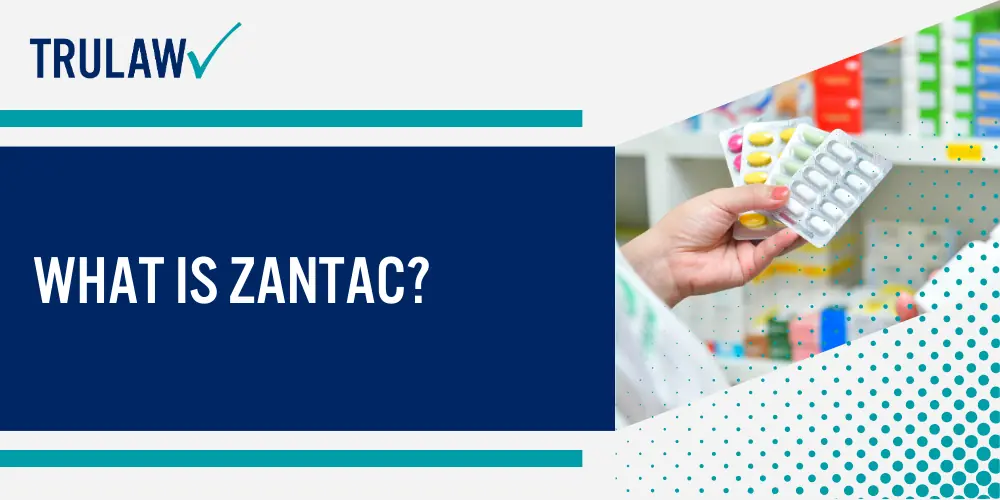
Zantac (ranitidine) is a histamine H2 antagonist that is available in both over-the-counter (OTC) and prescription form.
Zantac is primarily used in the treatment of gastroesophageal reflux disease (GERD).
Zantac decreases the acid production from the stomach for up to 12 hours assisting with the most frequently observed symptoms of GERD – heartburn and acid regurgitation.

Prior to its recall in 2019, Zantac earned the title of the best-selling drug in history.
Zantac was first FDA-approved in 1983 by GlaxoSmithKline.
By 1988, Zantac had become the world’s first-ever drug to top $1 billion in annual sales, worldwide.
In 1997, Glaxo’s U.S. patent for ranitidine expired and competitors launched generic alternatives to the drug.
Over-the-counter versions of Zantac were sold by Pfizer, Johnson & Johnson, Boehringer Ingelheim and Sanofi.
Zantac has been prescribed 15 million times each year and was predicted to surpass $485.4 million in U.S. sales alone by 2026, prior to its recall in 2019.
Although Zantac is the most prescribed and OTC-purchased brand of ranitidine, ranitidine is also sold under the names Acid Reducer, Taladine, Wal-Zan, Zantac 150, and Zantac 75.
These brand names are commonly supplied as 150 mg, 300mg, and as injections and oral solutions.
Is there a Zantac Recall from the Food and Drug Administration (FDA)?
Once the best-selling drug in history, Zantac has now been pulled from markets worldwide.
On September 13, 2019, the FDA released a statement alerting patients and healthcare professionals of NDMA found in samples of ranitidine.
Since the September 2019 FDA warning, numerous drug makers have recalled their ranitidine products.
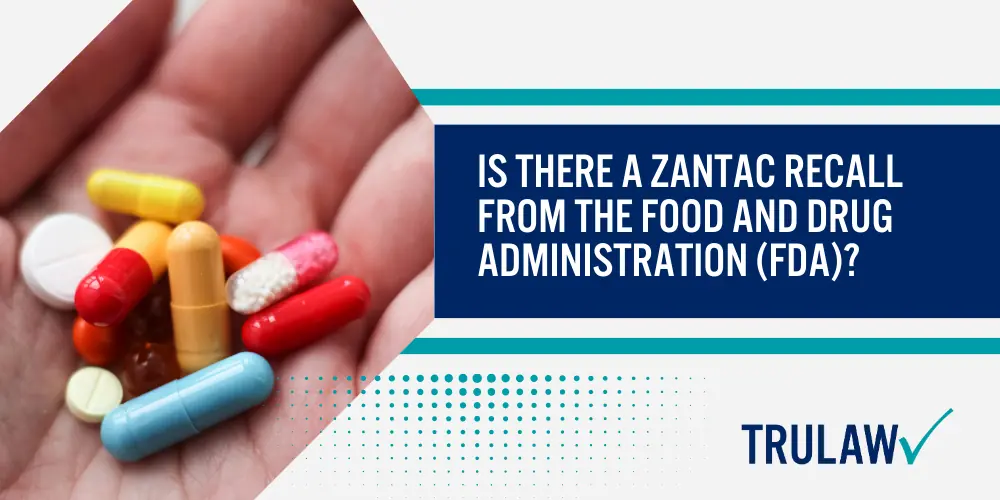
Over the course of three months, the French drug maker, Sanofi, recalled Zantac, drugstores and retailers voluntarily pulled the drugs from shelves and a half-dozen generic drug makers pulled ranitidine from the market.
The warning first came after Valisure, a Connecticut-based online pharmacy and laboratory, discovered NDMA in several forms of the drug and alerted the FDA.
According to Valisure, there were clues of the drug’s potential risk of cancer since a medical study published in the early 1980s.
What is NDMA?
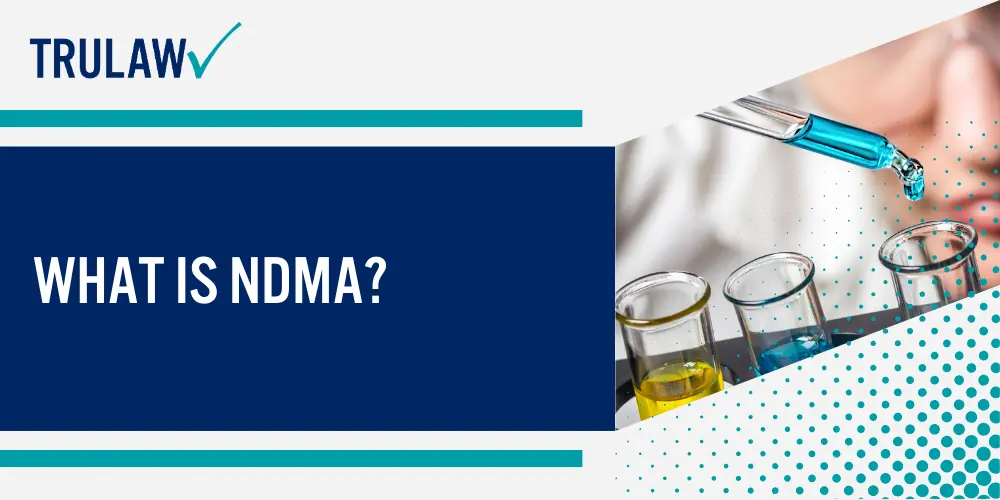
Nitrosodimethylamine (NDMA) is a chemical found in both industrial and natural processes.
It is a yellow liquid that has no distinct odor and is produced only as a research chemical in the U.S.
NDMA was used to make rocket fuel, but this use was stopped after unusually high levels of this compound were found in air, water, and soil samples collected near a rocket fuel manufacturing plant.

NDMA is classified as a probable human carcinogen (a substance that could cause cancer).
NDMA acts as a carcinogen because it modifies DNA.
Common blood pressure medications such as valsartan were found to contain NDMA earlier this year.
Valsartan lawsuits continue to be filed against the companies that distributed or sold blood pressure medicine found to contain NDMA.
Zantac Lawsuit – Risk of Cancer
Some investigators believe that NDMA may be the result of the formulation of the ranitidine molecule, which may break down when it is ingested in the human body creating NDMA.
The CDC notes that NDMA can form in the stomach during digestion of alkylamine-containing foods.
Alkylamines are naturally occurring compounds which are found in some drugs and in a variety of foods.
NDMA has ties to multiple cancers.
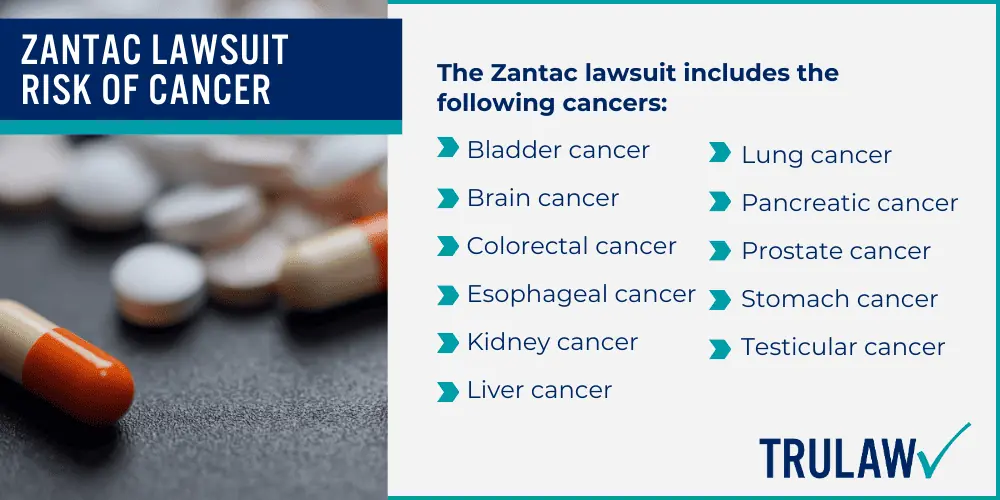
The Zantac lawsuit includes the following cancers:
- Bladder cancer
- Brain cancer
- Colorectal cancer
- Esophageal cancer
- Kidney cancer
- Liver cancer
- Lung cancer
- Pancreatic cancer
- Prostate cancer
- Stomach cancer
- Testicular cancer
What are the Side Effects of Zantac?
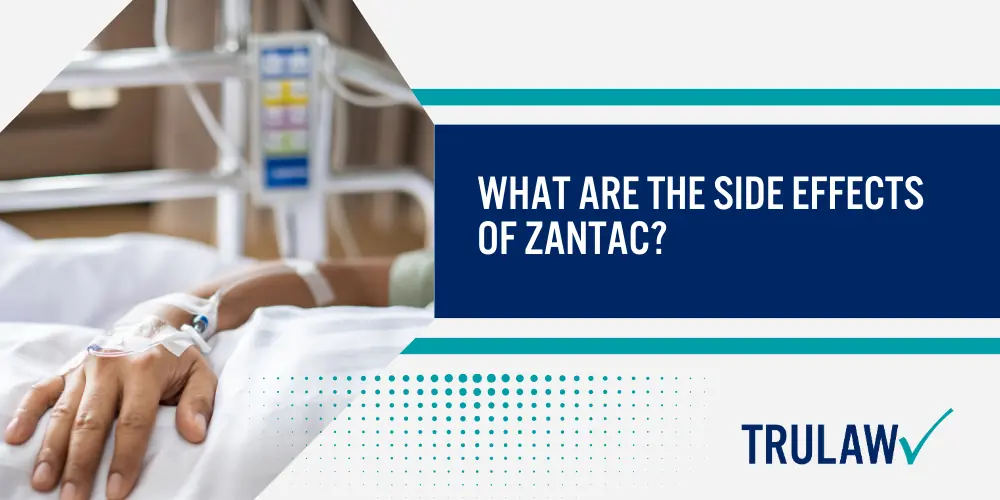
Studies show that long-term use of heartburn drugs may be linked to a higher early death risk.
However, news of NDMA from Zantac may put even short-term use at risk.
More studies are needed to understand risk.
NDMA has long been known to be very harmful to the liver of humans.

According to the CDC, it is reasonable to expect that exposure to NDMA by eating, drinking or breathing could cause cancer in humans.
Animal studies show that NDMA enters the bloodstream and goes to many organs of the body in a matter of minutes.
In the liver, NDMA is broken down into other substances, most of which leave the body.
How do I know if I have been exposed to NDMA?
If you were taking Zantac, ranitidine or any form of over-the-counter Zantac for any period of time, it is advisable that you reach out to your medical professional.
You should not stop taking any medications without speaking to your medical professional.
If you have been exposed to NDMA, It is likely your healthcare provider will order blood and urine tests.
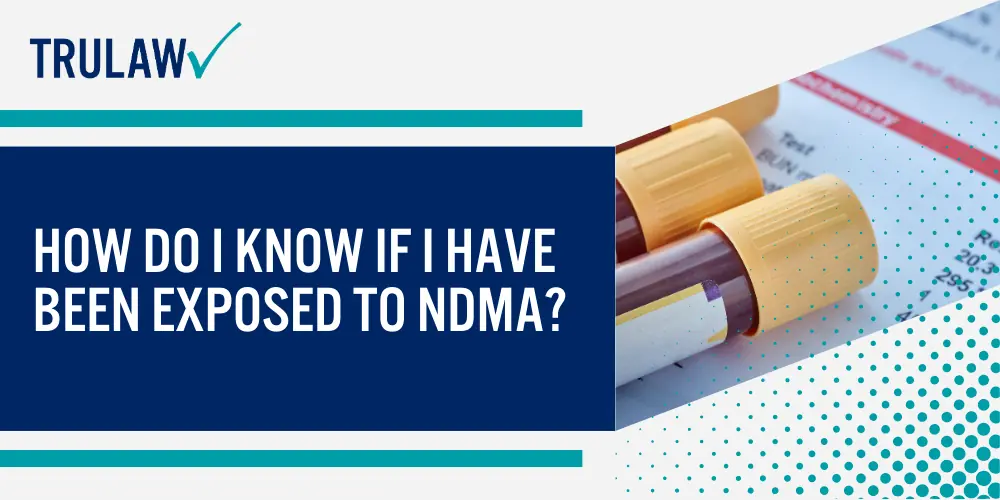
NDMA can be detected in blood and urine.
If your healthcare provider lets you know that NDMA has been found in your urine or blood, you may qualify for a Zantac lawsuit.
Reach out to a Zantac lawyer immediately to protect your legal rights from the Zantac recall.
Zantac – A New Kind of Drug Marketing is Launched
Zantac began its dominance of the acid/peptic marketplace with a novel launch strategy that marketed to both physicians and direct-to-consumers.
The direct-to-consumer market strategy depended on increased awareness of gastrointestinal disease in an effort to have patients ask for Zantac by name.
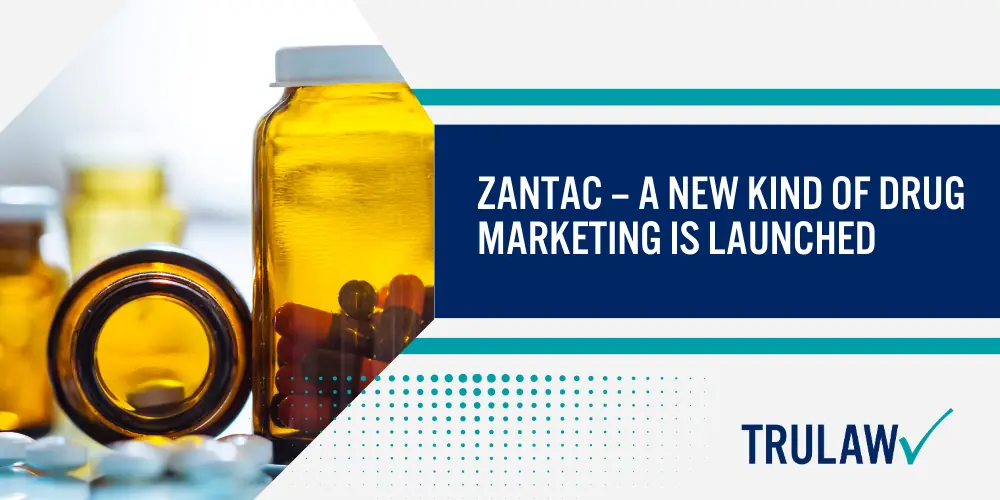
The use of public-service announcements, celebrity endorsements and the first-ever animated superhero for an over-the counter heartburn medication “Captain Zantac” skyrocketed sales for Zantac for more than two decades.
Using novel sales tactics like the 360-degree brand equity campaign run by Boehringer Ingelheim for “Captain Zantac” – the “only current animated character in the over-the-counter (OTC) heartburn medication category”.
Zantac Class Action Lawsuit and Individual Zantac Cancer Injury Lawsuits
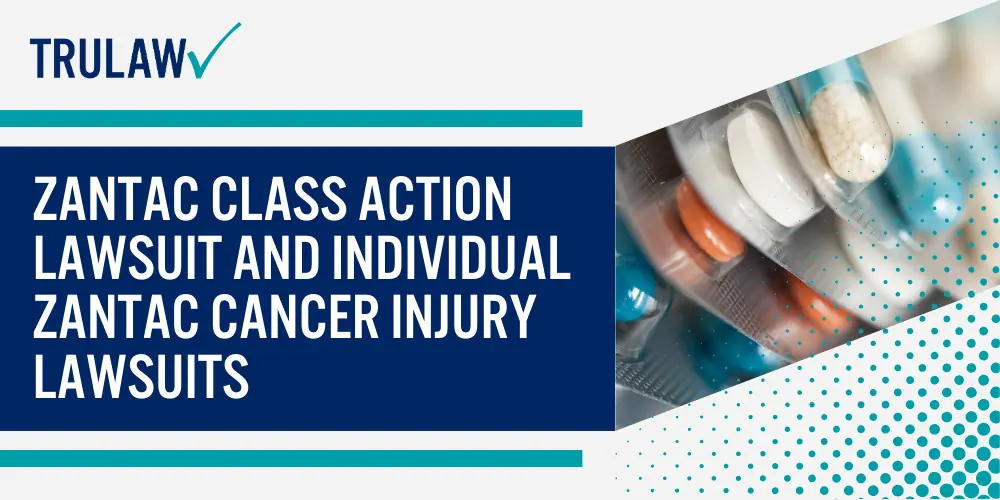
Zantac lawyers are predicting a massive number of Zantac lawsuits filed against Sanofi and its blockbuster acid reflux and heartburn medicine, Zantac.
As of October 2019, there were about a dozen lawsuits filed.
Courts are seeing Zantac class action lawsuits and individual Zantac cancer cases.
Zantac lawsuits allege that Sanofi and other drug companies knew that ranitidine metabolizes into unsafe levels of NDMA but failed to disclose this information to the public.

Zantac lawsuits allege that there is a fundamental defect with Zantac – when ingested, it forms NDMA in the body that exceeds FDA permissible intake limits by thousands of times.
Lawsuits further allege that the situation has been mischaracterized as Zantac containing an “impurity” instead of the possibility that the drug is inherently dangerous.
Zantac Alternative – Heartburn Medication
If you previously used Zantac, it is important you discuss options with your medical professional.
There may be alternatives that can assist with your symptoms.
To date, the FDA has not found NDMA in Pepcid (famotidine), Tagamet (cimetidine), Nexium (esomeprazole), Prevacid (lansoprazole) or Prilosec.
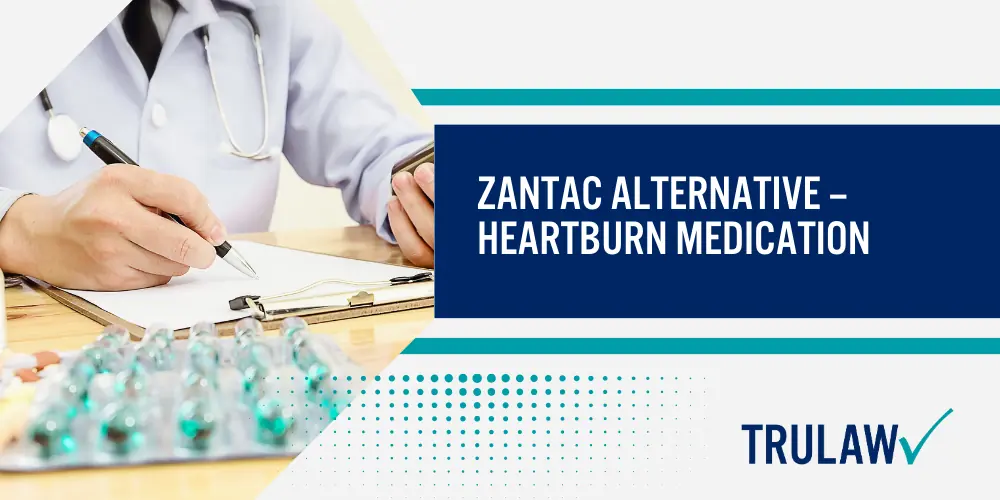

Managing Attorney & Owner
With over 25 years of legal experience, Jessica Paluch-Hoerman is an Illinois lawyer, a CPA, and a mother of three. She spent the first decade of her career working as an international tax attorney at Deloitte.
In 2009, Jessie co-founded her own law firm with her husband – which has scaled to over 30 employees since its conception.
In 2016, Jessie founded TruLaw, which allows her to collaborate with attorneys and legal experts across the United States on a daily basis. This hypervaluable network of experts is what enables her to share the most reliable, accurate, and up-to-date legal information with our readers!
Here, at TruLaw, we’re committed to helping victims get the justice they deserve.
Alongside our partner law firms, we have successfully collected over $3 Billion in verdicts and settlements on behalf of injured individuals.
Would you like our help?
At TruLaw, we fiercely combat corporations that endanger individuals’ well-being. If you’ve suffered injuries and believe these well-funded entities should be held accountable, we’re here for you.
With TruLaw, you gain access to successful and seasoned lawyers who maximize your chances of success. Our lawyers invest in you—they do not receive a dime until your lawsuit reaches a successful resolution!
AFFF Lawsuit claims are being filed against manufacturers of aqueous film-forming foam (AFFF), commonly used in firefighting.
Claims allege that companies such as 3M, DuPont, and Tyco Fire Products failed to adequately warn users about the potential dangers of AFFF exposure — including increased risks of various cancers and diseases.
Depo Provera Lawsuit claims are being filed by individuals who allege they developed meningioma (a type of brain tumor) after receiving Depo-Provera birth control injections.
A 2024 study found that women using Depo-Provera for at least 1 year are five times more likely to develop meningioma brain tumors compared to those not using the drug.
Suboxone Tooth Decay Lawsuit claims are being filed against Indivior, the manufacturer of Suboxone, a medication used to treat opioid addiction.
Claims allege that Indivior failed to adequately warn users about the potential dangers of severe tooth decay and dental injuries associated with Suboxone’s sublingual film version.
Social Media Harm Lawsuits are being filed against social media companies for allegedly causing mental health issues in children and teens.
Claims allege that companies like Meta, Google, ByteDance, and Snap designed addictive platforms that led to anxiety, depression, and other mental health issues without adequately warning users or parents.
Transvaginal Mesh Lawsuits are being filed against manufacturers of transvaginal mesh products used to treat pelvic organ prolapse (POP) and stress urinary incontinence (SUI).
Claims allege that companies like Ethicon, C.R. Bard, and Boston Scientific failed to adequately warn about potential dangers — including erosion, pain, and infection.
Bair Hugger Warming Blanket Lawsuits involve claims against 3M — alleging their surgical warming blankets caused severe infections and complications (particularly in hip and knee replacement surgeries).
Plaintiffs claim 3M failed to warn about potential risks — despite knowing about increased risk of deep joint infections since 2011.
Baby Formula NEC Lawsuit claims are being filed against manufacturers of cow’s milk-based baby formula products.
Claims allege that companies like Abbott Laboratories (Similac) and Mead Johnson & Company (Enfamil) failed to warn about the increased risk of necrotizing enterocolitis (NEC) in premature infants.
Here, at TruLaw, we’re committed to helping victims get the justice they deserve.
Alongside our partner law firms, we have successfully collected over $3 Billion in verdicts and settlements on behalf of injured individuals.
Would you like our help?












